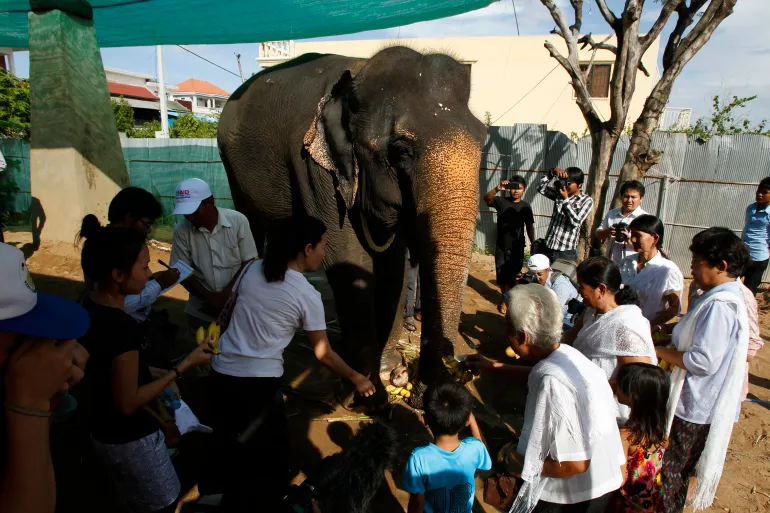Foreign News
Trump’s assault on USAID leaves China soft power opening in Southeast Asia

As the United States winds back humanitarian assistance in Southeast Asia, its rival China may see an opportunity to expand its influence in a region where it has directed billions of dollars in investment and aid, analysts say.
In a little over three weeks since US President Donald Trump’s inauguration, Washington has frozen nearly all foreign aid and moved to effectively abolish the US Agency for International Development (USAID), a longstanding source of soft power in the region.
USAID, the biggest disburser of US foreign aid, spent $860m in Southeast Asia alone last year, funding projects on everything from treating HIV to preserving biodiversity and strengthening local governance.
Many projects, which run primarily through grants to local NGOs, face an uncertain future as the Trump administration pulls the US back from the world stage as part of his “America first” agenda.
For Beijing, the circumstances provide an ideal opportunity for it to step in, said Yanzhong Huang, a senior fellow for global health at the Council on Foreign Relations.
“The suspension of health, education, and humanitarian programmes – key pillars of US soft power – may create vacuums that China can fill,” Huang told Al Jazeera.
“This strategic retreat could strengthen Beijing’s influence across the region, particularly in current US aid recipients like Indonesia, the Philippines, Myanmar, and Cambodia.”
As the Trump administration generated headlines with its moves to gut USAID last week, Beijing made news by stepping in with $4.4m to fund a de-mining project in Cambodia that had been left in the lurch by Washington.
Heng Ratana, head of the Cambodian Mine Action Centre, told the Khmer Times newspaper the Chinese aid would help his organisation clear more than 3,400 hectares (8,400 acres) of land filled with landmines and unexploded ordnance.
China’s embassies in the US, Cambodia and Thailand did not respond to Al Jazeera’s requests for comment.
Joshua Kurlantzick, a senior fellow for Southeast Asia and South Asia at the Council on Foreign Relations, said USAID’s demise comes as US influence in the region is waning more generally and as China scales up its public diplomacy.
Southeast Asian leaders are concerned about “chaotic policymaking” in the US, Kurlantzick told Al Jazeera, particularly in countries such as Vietnam, Indonesia and Thailand, where the US devotes significant aid and security assistance.
“Beijing is indeed already portraying the US as uncaring and unable to lead regionally or globally and I expect Beijing to increase its aid and investment now in many parts of the developing world,” Kurlantzick told Al Jazeera.
While the future of many USAID programmes in the region is unclear, some analysts believe that China is likely to leave projects with a more political or ideological focus to other partners to the region, such as the European Union, Australia, Japan or the Asian Development Project, a Manila-based regional development bank.
“China’s existing international aid or international development programme is quite sizeable. But it happens to be quite different from what USAID does in that the latter seems to be devoting a lot of resources to ideology-based initiatives, for democracy, for LGBTQ, for diversity, for inclusiveness, for climate change,” John Gong, a professor of economics at the University of International Business and Economics in Beijing, told Al Jazeera.
“Whether China is going to step into the void vacated by the United States, I am very sceptical. We are talking about different things here. And besides, I don’t think the Chinese government is keen on competing with Washington on this front,” Gong said.
China’s foreign assistance has been heavily geared towards infrastructure, as laid out in the Belt and Road Initiative (BRI), Beijing’s flagship infrastructure investment project estimated to be worth more than $1 trillion.
Other projects, such as its hospital ship Peace Ark, have provided medical assistance.
Almost all of China’s foreign aid to Southeast Asia – some 85 percent – has taken the form of non-concessional loans with a focus on energy and transport, according to Grace Stanhope, a research associate at the Lowy Institute’s Indo-Pacific Development Centre.

Beijing’s infrastructure-heavy approach has made it a visible presence in the region, albeit not always a popular one, Stanhope told Al Jazeera, due to delays and “blow-out” budgets for projects such as the East Coast Rail Link in Malaysia and Jakarta-Bandung high-speed rail line in Indonesia.
Some critics have referred to these and other projects as a form of “debt-trap” diplomacy intended to breed dependency on China, a charge Beijing has denied.
In a survey carried out by the Singapore-based Iseas Yusof-Ishak Institute last year, 59.5 percent of respondents across 10 Southeast Asian countries chose China as the most influential economic power in the region.
Just over half, however, expressed distrust of China, with 45.5 percent fearing that China could threaten their country economically or militarily. Japan was seen as the “most trusted” major power, followed by the US and the EU.
Though heavily focused on infrastructure, China has been slowly trying to shift its model of assistance towards more “soft” aid such as public health, agriculture and digitisation, said Joanne Lin, a senior fellow at the Iseas Yusof-Ishak Institute’s ASEAN studies centre in Singapore.
“The extent of China’s aid will of course depend on China’s economic ability as it is facing constraints such as its slowing growth and trade tensions with Washington which may limit its ability to replace US aid in full,” Lin told Al Jazeera.
Lin said Southeast Asian countries prefer a “diversified approach” to foreign aid and development assistance that is not dependent on a single donor – whether the US or China.
Despite its high-profile presence in Southeast Asia, China has been scaling back its development assistance in the region in recent years.
While China was the region’s top donor from 2015 to 2019, it has since slid to fourth place, according to the Lowy Institute.
Funding has similarly dried up, falling from $10bn in 2017 to $3bn in 2022, according to the think tank.
China faces its own problems at home, including slowing economic growth and high youth unemployment, that could limit its focus on affairs overseas, said Steve Balla, an associate professor of political science and international affairs at George Washington University.
“The domestic issues may serve to limit [Chinese President Xi Jinping’s] attention to international affairs. The issues with Belt and Road may limit the regime’s options for how to step into spaces left by the US,” Balla told Al Jazeera.
Bethany Allen, head of programme for China Investigations and Analysis at the Australian Strategic Policy Institute, expressed a similar sentiment.
“China is already capitalising on US disengagement in the first Trump era by deepening its economic, diplomatic and cultural influence in Southeast Asia. Initiatives like the Belt and Road Initiative, Confucius, and the Lancang-Mekong Cooperation Mechanism are tools for expanding soft power,” Allen told Al Jazeera, referring to a global programme to promote the study of Chinese language and culture, and a forum to promote cooperation between China and the Mekong subregion.
“However, China’s lowering economic growth means slowing BRI, resulting in the country’s soft power project might be less aggressive than in the past decade. High-profile debt concerns and pushback against Chinese influence [in Malaysia and Indonesia] also limit its appeal,” she said.
[Aljazeera]
Foreign News
Nationwide strike for better pay brings Greece to standstill

A nationwide general strike disrupted public services across Greece, with ferries tied up in port, flights grounded and public transport running only part-time as labour unions press for higher wages to cope with rising living costs.
The 24-hour strike on Wednesday was called by the two main umbrella unions covering the public and private sectors, seeking a full return of collective bargaining rights which were scrapped as part of international bailouts during Greece’s financial crisis.
Greece has emerged from a 2009-18 debt crisis, which saw rolling cuts in wages and pensions in turn for bailouts worth about 290 billion euros ($319bn) and economic growth seen at 2.3 percent this year, outpacing other eurozone economies.
Tapping on the country’s progress, the conservative government increased the monthly minimum wage by a cumulative 35 percent to 880 euros ($970). But many households still struggle to make ends meet amid rising food, power and housing costs, the labour unions say.
The country braces for further global financial turmoil triggered by US tariffs.
[Aljazeera]
Foreign News
King and Queen meet Pope Francis at Vatican on their anniversary

King Charles and Queen Camilla have had a private meeting with Pope Francis at the Vatican where he wished them a happy 20th wedding anniversary.
In a statement released by Buckingham Palace, the King and Queen said they were “delighted the Pope was well enough to host them – and to have had the opportunity to share their best wishes in person”.
The meeting took place on the third day of their state visit to Italy and ahead of a state banquet in Rome on Wednesday evening.
It is understood the meeting was only confirmed on Wednesday morning. It came after previous plans for the couple to meet the pontiff in a state visit to the Vatican were postponed because of the Pope’s ill health.
(BBC)
Foreign News
Belgian prince loses bid for benefits on top of £300k royal allowance

A Belgian prince’s attempt to claim social security benefits on top of his six-figure royal allowance has been rejected by a court.
Prince Laurent – the younger brother of King Philippe – received €388,000 (£295,850; $376,000) from state funds last year but said that his work entitles him and his family to social security.
He had argued that he was partly self-employed because of the duties he carries out as a royal, as well as running an animal welfare charity for the past decade.
Laurent, 61, said he was acting out of “principle” rather than for money. The court disagreed.
“When a migrant comes here, he registers, he has a right to social security,” he told Belgian broadcaster RTBF.
“I may be a migrant too, but one whose family established the state in place.”
But on Monday a court in Brussels turned down Laurent’s request on the grounds that the prince can be considered neither self-employed nor an employee.
However, according to broadcaster VTM the judge acknowledged that the prince should actually be entitled to a pension – but said gaps in legislation made that impossible and called for the law to be amended.
His lawyer, Olivier Rijckaert, told Belgian newspaper Le Soir that Laurent’s request had not been based on a “whim” and insisted on its symbolism, saying that social security is “granted by Belgian law to all residents, from the most deprived to the richest”.
Mr Rijckaert also said that most of the prince’s allowance is spent on his assistant’s salary and various travel expenses.
This means Laurent is left with about €5000 (£4300; $5500) a month but no social security benefits, such as the right to claim back some medical expenses.
The prince – who has three adult children with British-born wife Claire Coombs – has also expressed his concerns over his family’s wellbeing since the royal allowance will be cut when he dies.
Laurent took legal action against the Belgian state after his application for social security was refused. A first hearing was held in November 2024.
According to RTBF, the prince and his legal counsel have not yet decided whether to appeal the court’s decision.
Laurentm who is the 15th in the Belgian line of succession, is no stranger to controversy and is sometimes termed the prince maudit – the “cursed prince” – in Belgium.
In 2018, the Belgian federal parliament voted to dock his monthly allowance for a year after he attended a Chinese embassy reception without government permission, in full naval uniform.
He has also racked up several speeding fines and has been criticised for attending meetings in Libya when the late Muammar Gaddafi was still in power.
[BBC]
-

 Business3 days ago
Business3 days agoColombo Coffee wins coveted management awards
-

 Business5 days ago
Business5 days agoDaraz Sri Lanka ushers in the New Year with 4.4 Avurudu Wasi Pro Max – Sri Lanka’s biggest online Avurudu sale
-

 Features4 days ago
Features4 days agoStarlink in the Global South
-

 Business6 days ago
Business6 days agoStrengthening SDG integration into provincial planning and development process
-

 Business5 days ago
Business5 days agoNew SL Sovereign Bonds win foreign investor confidence
-

 Features1 day ago
Features1 day agoSri Lanka’s Foreign Policy amid Geopolitical Transformations: 1990-2024 – Part III
-

 Features4 days ago
Features4 days agoModi’s Sri Lanka Sojourn
-

 Midweek Review1 day ago
Midweek Review1 day agoInequality is killing the Middle Class











